'There's an attack on all forms of intelligence' - Arundhati Roy
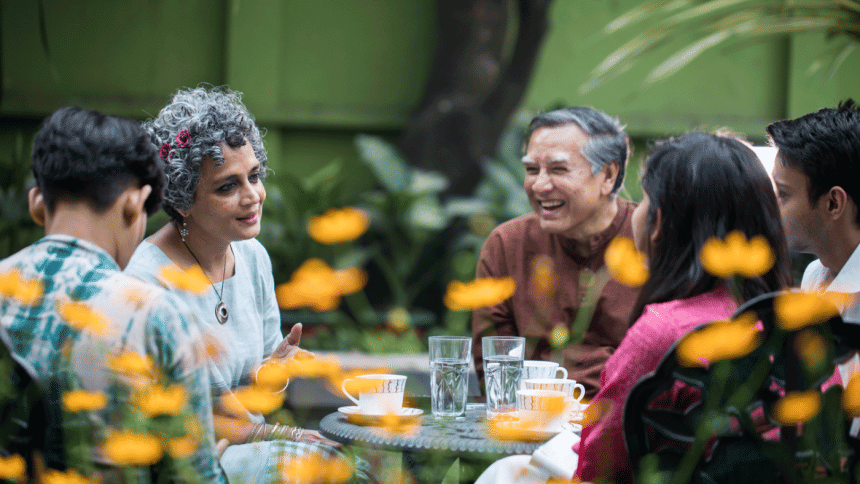
Author Arundhati Roy, in conversation with The Daily Star's editor Mahfuz Anam, Sushmita S Preetha and Moyukh Mahtab on March 4 spoke about her books and her childhood, the global and regional political scenario, the role of writers, and the importance of dissent. About Kashmir, she referred to her recently published powerful piece for the Huffington Post, which this paper printed on March 5.
Everything you write is so brilliant—how do you manage?
Well, I can't answer that question without sounding immodest. To be honest, I don't feel like I have to write, or write a certain amount. I only write when something really persuades me to. I was joking with a friend that in June there's going to be a new book of collected essays coming out, called My Seditious Heart, and isn't it strange that three books are my life's work? It doesn't seem to be a lot. In an odd way, I am not a very ambitious person. But I am ambitious about my art when I do it. To intervene in small ways, like my recent Huffington Post article. I wasn't going to do it, but then I spent a couple of nights unable to shut my eyes thinking how everybody is talking about everything except what ought to be spoken about. It's shameful. Then you just can't settle until you do it.
We are curious about your childhood. How did the circumstances in which you grew up shape your choice of issues and your passions?
First of all, maybe I have something to do with you, because my father's family is from Bangladesh. But I actually never knew him. My mother is from Kerala, and they were separated when I was just one year old and I never knew anything about that part of my family for a long time. In Kerala, my mother comes from a very small, traditional community, the Syrian Christians. Unlike the rest of the Christians in India, they are a very closed elite community and very conservative.
Therefore it was a shocking thing that my mother married outside, that she got divorced, and she came back—much like in The God of Small Things. So one was always outside of this grid—it's an iron grid of hierarchy and community in India. I mean every society in the world has it, but I would say India is an exception because caste is added to class. I grew up watching my mother being humiliated in some ways, although she is the most spirited person I know. A lot of her anger about what was happening to her used to be taken out on us. Even the family was not a safe space. So as a very young person you were trying to understand why all this was happening.
That's not an explanation of why one is a writer—my brother went through the same, and he is not a writer. For a writer, or somebody who is going to be a writer, it is an interesting and strange background—because you don't really fit into anything, and therefore you are watching everything, trying to understand what's going on. I am not saying "oh, I was so oppressed"—no. But, I had my own upbringing. I wasn't indoctrinated because the required governing body to indoctrinate me wasn't there.
When did you first feel that you were a writer, that you had this incredible ability to express?
It's not like I realised I had an ability, but I knew writing is how I would express myself. When I was growing up, there was this very cruel Australian missionary called Ms Mitten. She was the first person who taught me, and every day she would say to me, "I can see Satan in your eyes." I went home one day and wrote, "I hate Ms Mitten and I think her knickers are torn." There was always this sense of trying to express myself through writing.
When I became older, I left home. My mother is a very powerful person—she broke the spirit of this very conservative town all by herself. Whenever people ask me about her, I say she is like a character who escaped from the sets of a Fellini film. She was very free but also very controlling and so even with her, there was conflict. When I was 16, I left home to study architecture. I told her that I was not coming back. I didn't go home after the first year. I put myself through college by working in various offices or through drawing. In those years, one was an architect and not a writer at all. In architecture school, you rarely write. But architecture is fundamental to my writing.
On that note, you have said before that with The Ministry of Utmost Happiness, you wanted to see if a book can be like a city. Could you elaborate how architecture ties in with your writing?
By the time I was in third or fourth year architecture, I already began to be someone who was sort of uncomfortable with everything I was being taught, even about architecture. About material, how things should be designed, why they should be designed in this way. I was in constant trouble in college. In the final year, you are supposed to do a thesis—some hospital or housing complex—and I refused. I said I wanted to do a thesis on the city: How the city came to be what it is, what it does to those who live in it, how cities are designed to keep certain people out, how the institutions of the cities work, how spaces work.
Like going to a fancy cinema hall in Delhi—if you come from a certain class, even if you have the money, they wouldn't let you in. And you wouldn't feel comfortable. That's architecture. But I also say there is a citizen and a non-citizen. And the non-citizen lives in the cracks between the institutions. In fact in The Ministry, there's a moment which is so connected to my thesis: when Tilottoma is looking out of her window and she is waiting for Saddam to come, she sees these women who are gathered around a manhole, and a kid is shitting directly into it. She says that maybe this is like a direct deposit into the sewage system, because even the sewage system excludes them. And I actually remember saying that in my architecture school thesis.
What I meant about the book being like a city is more like the understanding of a city like Delhi—and I am not talking about the physical space. I am talking about the narrative where a city sort of overwhelms you. You can't motor through The Ministry of Utmost Happiness in the same way you can't drive through Delhi and think you know it. You have to get lost. There's a fear that is created in fiction, that you have to have a few characters, and then everybody has to know them well. In The God of Small Things, there's the safety of family, even if it's a broken family, those people are familiar. In The Ministry, it is already shattered, everything is broken. In fact, the shards of those broken hearts are brought together in the graveyard. And you meet people in the city, and say: this is the postman, this is the taxi driver—and I am like no, they all have stories and names, and you better meet them.
So, The Ministry, is like that. It tries to plan, and it is unplanned, and then it is broken in its narrative. Ultimately, like all cities, the chaos is also part of the plan.
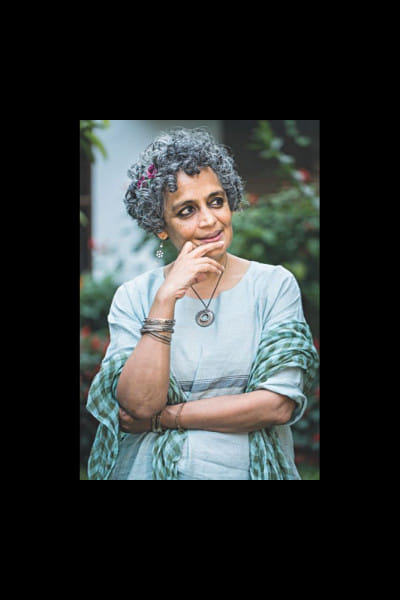
You said writers are afraid to be political these days. Why?
They are not afraid in the sense of the Stalinist era—of course in some regimes they are. Here [in Bangladesh] they are afraid; in India people are beginning to be afraid. People have been assassinated and killed. This morning, I was talking to people who had come from all over the world for Chobi Mela and they were saying how it's all very exciting, the work that is happening here. I said yeah, because for us here, there's always that danger hanging over us. If you are from a regime that practices free speech, what happens sometimes is that writers live between literary festivals and bestseller lists and good reviews and all that. For us, it's much more edgy. But the danger is that most writers have bought into that completely commercial understanding of literature now. It's not that you are worried of writing politically because your head will be cut off, but because you think that this is not art! There's some strange notion of art, I don't know where it came from. I always say, why do people call me a writer-activist? Because you have reduced the definition of a writer to mean some kind of anodyne thing, who doesn't look around, doesn't understand what's going on.
But of course, writers are also being killed. Gauri Lankesh was killed. When I was writing The Ministry, I was terrified. I had to tell myself that "you just write it, however you want to, and keep it in your drawer". That's the only way I could write it. But we also have to be strategic. I just gambled on the fact that if the book was what I wanted it to be, it would be published all over the world. I kept it quiet in India, and had 49 publishers around the world. In 2017, I travelled everywhere, except in India, so that it would become ridiculous if they tried to ban it in India. But that's a luxury that I had—I mean I earned it with my own work—but everyone doesn't have it. You can get shut down.
You have said that censorship "is being outsourced to the mob" and we are creating "micro-fascists". Please elaborate.
Yeah, what happens now is that you have all these vigilante groups. It's free-for-all season. Bollywood makes a film—some nonsensical film—and some group will come and say they don't like the history or the representation. It's not like what's happening in Syria or Afghanistan, where there are fundamentalist forces. It's more direct. It's a new experiment in infusing modernism with this kind of medieval poison, which people need to study. It's got all the accoutrements of modernism. There's a symbiotic relationship between these crazy TV channels, and these crazy WhatsApp groups that are sending fake videos and rumours around. WhatsApp in India is the medium of choice for the micro-fascists. It's not the government vs the people. It's the poisoning of the body politic itself. Even if the government is voted out, the institutions have been penetrated.
Let's say you are a Bollywood filmmaker, and you have spent millions on a film; any idiot on the street can say, burn this, it's not showing so and so in a good light. And that's the end of you.
How do you assess the role of the Indian media in this context?
We have 400 24/7 news channels operating in a country and India bombs Pakistan and even before the bombs hit, they were almost showing footage. But it didn't happen! Reuters sent journalists, and it didn't happen, but if 400 news channels are telling you otherwise, then it must have happened! It's gone beyond Chomsky's Manufacturing Consent; it's a psychotic space now. We have major TV anchors saying, "We don't want condemnation, we want blood". There are only two ways now, you are either national or anti-national. Students are being attacked, activists are being attacked.
You have weapons dealers running TV channels—the guy who wants blood, his TV channel is owned by a weapons dealer! Of course he wants blood. And calling out people by name; there are lynch mobs in the TV studio.
I am terrified of this phenomenon of the 400 24/7 news channels. Now, shamefully they publish whatever they like. I mean the nuclear strike is one thing, but take this example of this young boy called Umar Khalid, who was a JNU student, a leftist. But in 2016, because he was in this protest in JNU, they suddenly said that he is a Muslim, a terrorist, that he has been to Pakistan. All invented by the mainstream TV. Then somebody tried to kill him. What is he going to do? No one will give him a job, he can't go out, he has no protection. They destroyed someone just because they felt like it.
Democracies seem to be taking a backseat globally, governments are more and more powerful, they are usurping the powers of other institutions like the judiciary and the parliament. In the 21st century, why are we losing freedom? Suddenly, democracy is not really the first choice.
When I speak about it in India, one of the ways I explain it is that in the late 80s and early 90s, the government opened two locks. One was the lock of protected markets, and one was the lock of the Babri Masjid. The opening of the two locks unleashed two kinds of fundamentalism: economic fundamentalism and religious fundamentalism. Obviously in India it was Hindu fundamentalism; but in general I mean majoritarian fundamentalism. What that did is that it allowed the state to create these bogeymen, anti-development or anti-national—the two have converged now. It allowed the state to militarise. I am not sure if this is the same in Bangladesh, but in India, in order to push through these neo-liberal policies, you had to become a police state. Because you are depending on displacing hundreds of thousands of people. What you see in Central India is the police force turning into an army. It has an enemy. The police have told me that across the river, in the middle of India, they call the place Pakistan, and they shoot to kill. In Kashmir, the army is turning into the police, into some kind of administrative force. All of it is a form of militarisation, because you can't push through any of this without a militarised state.
You are going to see this happening at a much greater pace now. Oxfam shows that nine individual Indians own the combined wealth of the bottom 500 million. How is that going to be maintained without a police force? Last week the Supreme Court passed an order which said that 20 lakh adivasis are to be evicted by July. Now they have put a stay on it. You are willing to strip them of everything they have, legally, whereas if you said that strip these nine people, you'd be saying "but that's crazy". Our imaginations have been distorted to the point of lunacy.
What is the issue that is uppermost in your mind today?
I don't see things as issues. For me, it's a worldview. The dam and the caste and Kashmir are not separate. The Ministry of Utmost Happiness tells you that. That's what fiction does, it tells you that these things are all connected. But right now, what must be in everybody's mind would have to be how close we came to a nuclear war. And the kind of corrosion that we are facing. If we have a dictator and people can see that this is a bad guy, and we are scared of him, that we might go to jail, let's keep quiet—that's one thing. But if you have this kind of poison that is being directly dripped into the bloodstream of the people, how do you recall that? How are we going to heal ourselves?
If you have seen the pronouncements of Indian "scientists" at the science congress, saying that Einstein's theory of relativity is wrong, and that one of them has written a letter to Stephen Hawking that the theory of black hole is wrong, and that they should rename magnetic waves as the Modi wave—what can you do with these people? They are changing science and history books. If you were to take away one generation of farmers, the next generations would not know what to do with the land. The same way, if they actually manage to destroy this coming generation with this level of rubbish, who do you talk to? The greatest danger is not fascism, it's cretinism. It's not that there's only an attack on intellectuals, there's an attack on all forms of intelligence. They are very suspicious of intelligence.
From where I sit, I find that with the rise of fundamentalists (Hindutva, Buddhist fundamentalism in Myanmar and so on), our struggle to remain secular is more and more challenged.
The thing is, these are names, but they are all forms of majoritarianism. The line between democracy and majoritarianism—it's an osmotic skin, and the former can so easily turn into the latter, which can morph into fascism as we know from history. It has such fertile ground in our own history.
You've been vocal against the caste system in your fiction as well as your non-fiction. How do you navigate your own caste identity?
I don't have a caste identity, because I am not a Hindu. A lot of people thought my father was a Brahmin, but he was not. He was a Brahmo Samaji, who then became a Christian. But that argument that only Dalits can write about Ambedkar or one shouldn't write about Gandhi—that's an opinion, but I don't agree with it at all. My caste identity is totally muddled; I don't fit in anywhere. The RSS keeps putting this thing out that she is actually a Christian, as if that immediately means I would grow horns. Everyone says whatever they like.
As for criticism, you can't react to it in some stupid way—you have to accept that it is a complex thing, and you have to take care of what you are saying and why you are saying it.
India is so complicated—people outside can't fully grasp the way caste operates. People think if you write in the vernacular, you are a radical person. But that's not true because the vernacular itself is colonised by the upper castes. A lot of radical Dalits choose to write in English, for instance. There are so many streams of things that are happening.
You asked one of your comrades in central India when living inside the forests what was the most ridiculous denial they had to issue. What is your most ridiculous denial?
Fortunately, because I am an individual, most of the time I don't deign to deny anything. I am like, "Believe what you want man, I never said I was a nice person". In fact, days before The Ministry came out, there was this fake news (it started in Pakistan and then it was picked up big time by Indian media), that Arundhati Roy was in Srinagar and said something about how the Indian army will be defeated. The Bollywood crew started tweeting, and one guy said I should be used as a human shield. But I didn't deny it because I felt it was so ridiculous. Then finally the editor of The Wire texted me asking if I had done it. I just replied saying, "Crap". Then they did an investigation and found that it was all made up.
There's this whole thing that you can be political only if you are really virtuous and you wear khadi and so on is. When I wrote The Greater Common Good, it was the first time I faced this very hostile onslaught. They invented stories about how I have some illegal house in the forest. I said, "Wait, after you finish shouting, can I say something?" I said, "Assume that I have an illegal house in the jungle, a palace even, it's stuffed with drugs, there are bonded tribal people working there night and day, carrying bricks of gold around, and I am not a virgin—but why do you have to build a dam? Like what's the connection!"
None of us can be completely virtuous—I am not saying we should be completely terrible—but why do we all have to be saints to be political? It's a way of keeping people out.
There was an expression of yours which I found very intriguing—"the perils of being reasonable". I have an idea of what you mean, but I would like you to elaborate on it.
When I first started to write my political essays, there was such a huge discomfort, most especially among the upper caste establishment male people. And then among academics and journalists, and the whole idea was that you should be reasonable: "On the one hand this, on the other hand that". I had just written a book which sold 8 million copies and won the Booker Prize, but they felt free to lecture me about how to write, what to say, what subjects I could talk about, how I should not be angry. There was this continuous barrage of advice about how to be reasonable, how to write, how to be moderate. I am just like, come on, nobody won an award by being reasonable, let's just not be frightened of our passions. Passion and reason, like fiction and fact, are not binaries.
Then I released The Ministry at the Brooklyn Academy of Music, so there was this huge crowd, and questions were coming in online. And someone said, "You are being accused of being hysterical." Yes, hysterically accused of being hysterical! Shrilly accused of being shrill. I asked, "Every woman in the audience who has not been called hysterical, put up your hands!" It's the standard, most unimaginative insult. I am hysterical! There's some crazy shit going on. I am shouting from the rooftops, and you are like: "Go tell your grandmother quietly". Of course, I am hysterical, shouldn't you be?
What I really meant was that at any given time, say in the 70s and 80s, if you were in South Africa, any reasonable person would have thought apartheid would never end. Even in a tennis match, if you are two sets down, if you are a reasonable person, you are not going to come back.
So how do we carry on your struggle? Everything seems to be so overwhelming.
Well, I don't associate myself with struggle as such. I find it more as a way of seeing the world which is against the grain of what we are being forced to see. "Struggle" somehow removes the beauty and poetry and the music and joy and reduces us to struggling people. We are also people who have a much more beautiful sense of the world because of the way we see it. I have written about that often enough. Even if you go to a place like the forest, where I spent three weeks with the comrades, from the outside you see this sort of horror of what is going on, but inside you spent so many nights just laughing.
I don't know what's going to happen in India with the next election. But the fight is on. I mean even with the 400 24/7 propaganda channels, people are still standing up. What else can you do? Ultimately, in the long run, whether we win or lose, we are not going to be on their side. So we might as well do what we have to do as well as we can.

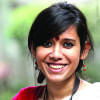
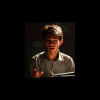


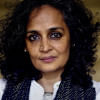
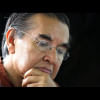
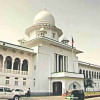



Comments